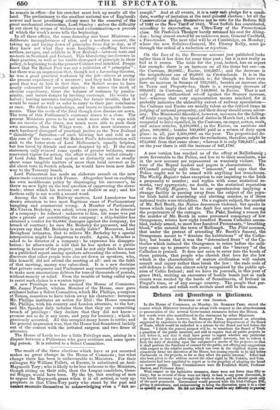A new version has reached us of the affray at
Ballinhassig more favourable to the Police, and less so to their assailants, who in the new account are represented as wantonly violent. The tone of the Repeal leaders and papers is characteristic. Mr. O'Connell actually calls them "innocent," and says that the Police ought not to be armed with anything but truncheons. The Weekly Register takes exception to our imputing to the Irish a propensity to murder ; and replies with some statistical re. marks, very appropriate, no doubt, to the statistical reputations of the Weekly Register, but to our apprehension implying a strange facility in passing away from the subject of the popu- lar Irish habit of murdering and abetting murder, as if those national traits were trivialities. On a cognate subject, the murder of Mr. Bell Booth, the Nation denounces violence, but speaks in terms which imply that all the fault lies anywhere but among, the perpetrators of the outrages. The Pilot, finding a reason for the murder of Mr. Booth in some presumed conspiracy of low Orangemen, relates how eight hundred Roman Catholics assem- bled, rudely armed, to meet four hundred Protestants, "breathing blood," who entered the town of Ballinagh. The Pilot assumes, that under the pretext of attending Mr. Booth's funeral, the, Orangemen meant to "desolate the habitations" of the Catho- lics; but boasts that it was the "determined front" of the Ca- tholics which induced the Orangemen to retire before the mills tary came up to preserve the peace ; and the " bravery " of the Catholics is praised. It does not seem to enter into the beads of these patriots, that people who cherish that love for the law which is, the characteristic of mature civilization will endure assault and injury rather than break the law : the rude code of self-defence is the one almost solely recognized by the public opi- nion of Celtic Ireland ; and we have its journals, in this year of grace 1845, reciting an encounter of hostile bands just as such events were recited by the bards of Scandinavia, of Ireland in_ Fingal's time, or of any savage country. The people that per- form such acts and relish such recitals must still be the same.


























 Previous page
Previous page